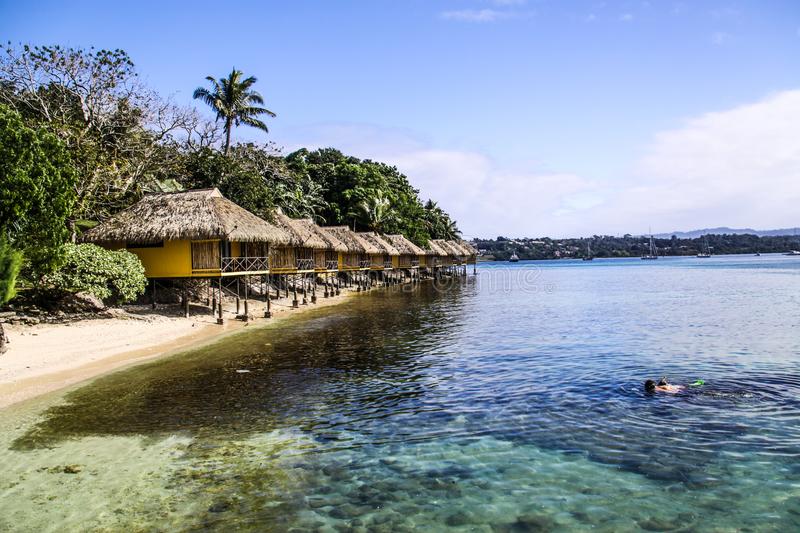Vanuatu’s climate change minister said the COP27 climate talks will be considered a “failure” if they do not end with a new fund for compensation of vulnerable countries to address “loss and damage” caused by global warming.
Vanuatu, according to Ralph Regenvanu, was the first country to use the term “loss and damage” at the United Nations climate talks in 1991.
Large parts of the world are currently suffering from the accelerating effects of climate change, and poorer countries on the frontlines are seeking assistance and compensation to cope and recover.
At COP26 in Glasgow a year ago, developing countries made a strong case for a new fund or facility to channel “loss and damage” finance, but only a three-year dialogue was established.
In an interview at the talks in Egypt, Regenvanu, who is also a member of parliament for Vanuatu’s capital Port Vila, said: “This is where it has to happen.”
Vague language on funding arrangements in a final decision text with no precise compensation, he said, would not be acceptable to island nations like his, which are threatened by rising seas and more powerful storms.
The issue is at the top of the political agenda at COP27, with developing countries pushing hard for a proposed new finance facility but facing opposition from some rich countries, such as the United States, who prefer to use existing funds and institutions.
“Loss and damage” refers to the physical and psychological harm that occurs when people and places are not prepared for climate disasters or are unable to adapt their lifestyles to protect themselves from slower impacts such as coastal erosion or creeping deserts.
A significant portion of “loss and damage” can be quantified in monetary terms, such as the cost of destroyed homes and infrastructure.
However, there are other non-economic losses that are more difficult to quantify, such as graveyards and family photos being washed away, or indigenous cultures that may vanish if an entire community is forced to relocate because their land is no longer habitable.
Where should islanders go?
Regenvanu, a former minister in charge of land issues, said Vanuatu’s government needed to do more to assist people living in low-lying areas near the sea who are struggling to cope with worsening floods and saltwater intrusion into soils.
We’re seeing a lot more problems now, like heavy rain causing landslides… (and) large areas becoming uninhabitable due to water damage and flooding, he said.
As a result, we’ll have to investigate large-scale internal resettlement.
The government’s main priority is to keep people safe from growing climate threats, but this is becoming more difficult, according to Regenvanu.
People are simply moving with their feet right now, leaving areas… He stated that they must move or risk losing their lives.
They can at least relocate to higher ground in mountainous areas of Vanuatu, where their ancestors used to live before colonizers and missionaries encouraged them to move down to coastal areas, according to Regenvanu.
Sea level rise will not destroy our country, he said, adding that lower-lying Pacific island nations such as Tuvalu and Kiribati may face the same existential threat.
However, the minister stated that the government of Vanuatu, which has a population of about 280,000 people spread across 80 islands, requires financial assistance to pay for costly measures to relocate and protect its citizens.
He added that at least half of the country’s population, as well as a portion of the capital, may eventually be forced to relocate.
Vanuatu is now allocating 15% of its budget to dealing with the effects of climate change, the same proportion as it does to health and education.
And, according to Regenvanu, it has yet to receive significant amounts of climate finance from international donors.
Vanuatu has received approximately $100 million in climate funding over the last ten years. It lost $600 million due to top-strength Cyclone Harold alone in 2020.
Vanuatu was one of the first countries to cost new loss and damage measures in its updated national climate action plan earlier this year.
Offering micro-insurance, constructing public buildings and infrastructure to reduce climate risks, providing healthcare, protecting people displaced by disasters, and relocating communities away from threats are among them.
The plan estimates that implementing these measures will cost nearly $178 million by 2030, with donors covering
Compensation or see you before court!
Vanuatu believes that using the courts is an important way to ensure that high-emitting countries fulfill their commitments under the Paris Agreement on Climate Change, such as delivering on unmet pledges of climate finance, and other international treaties.
It is expected to present the final version of a resolution to the United Nations General Assembly for a vote by member states in mid-December on Friday.
The resolution requests an advisory opinion from the International Court of Justice (ICJ) on states’ international legal obligations to protect the rights of present and future generations from the adverse effects of climate change.
Vanuatu claims to have gathered a global coalition of more than 85 nations in support of the resolution and is confident of obtaining the simple majority required for approval, but Regenvanu says it is still working to enlist the European Union.
An ICJ opinion cannot compel countries to act and give compensation, but it can set a “very important precedent” and influence courts at all levels, from local to international, according to Regenvanu.
It will clarify (states’) obligations under the Paris Agreement in terms of finance, assistance to developing countries, and other areas, he said.

